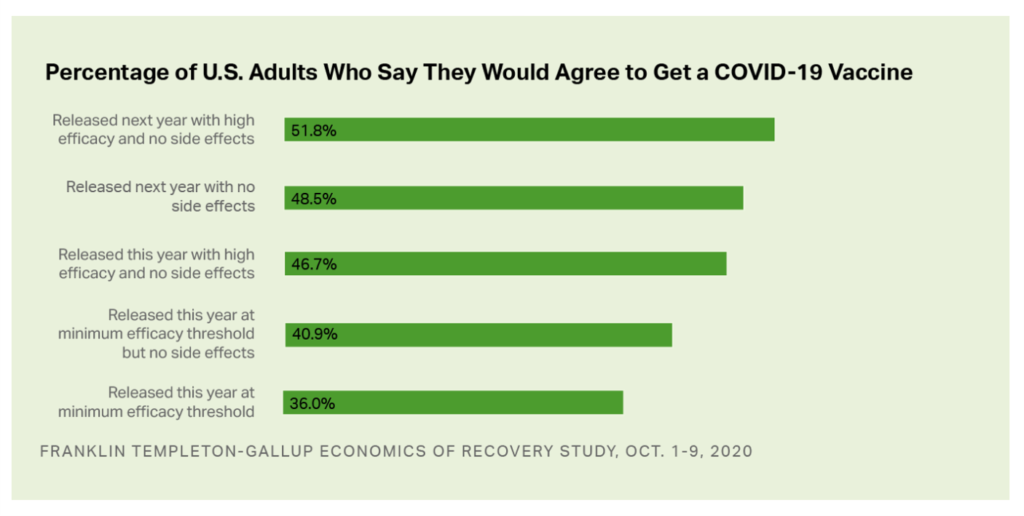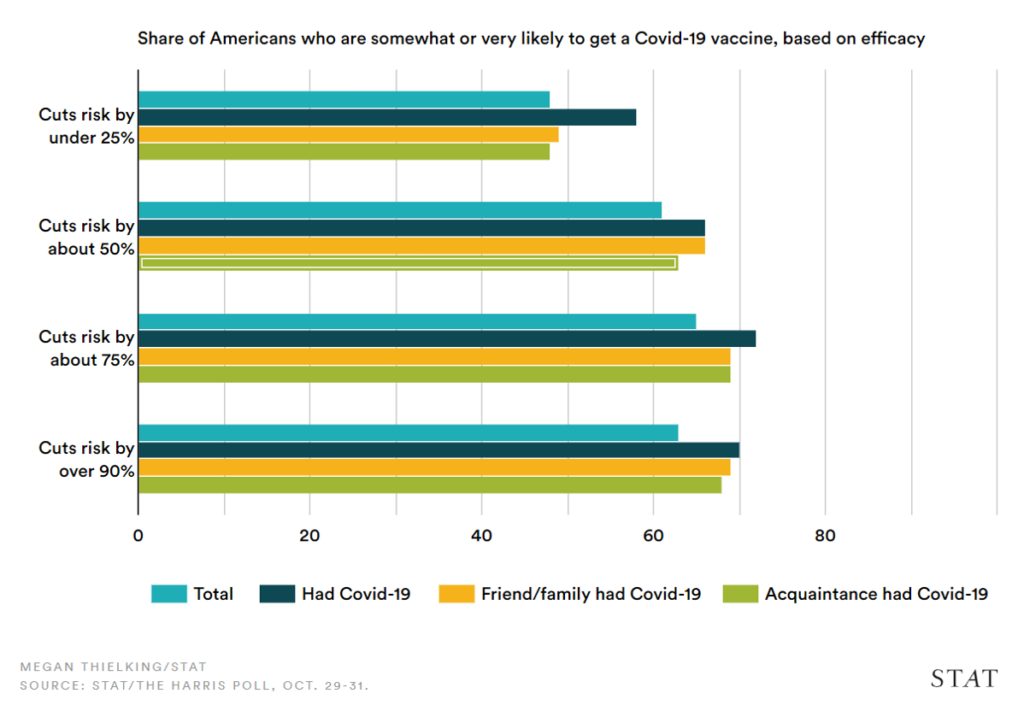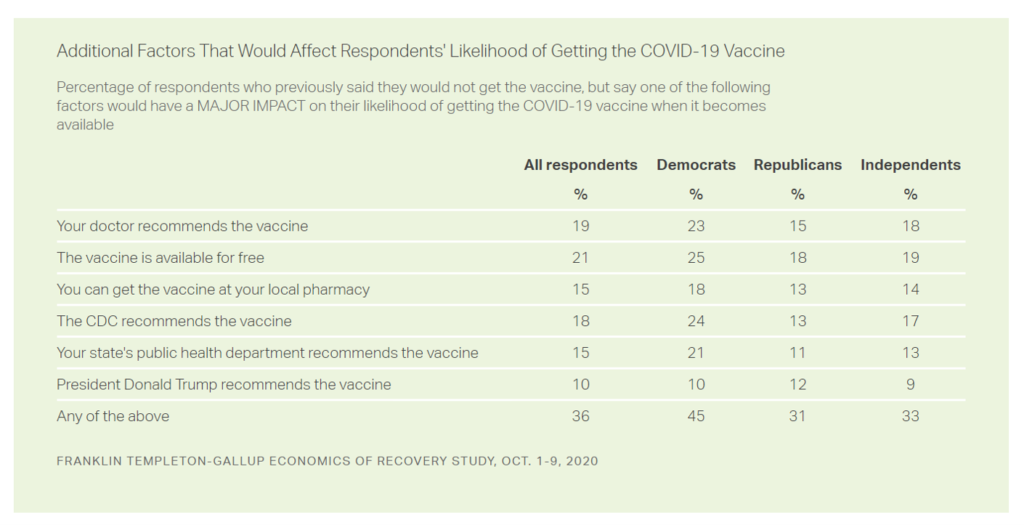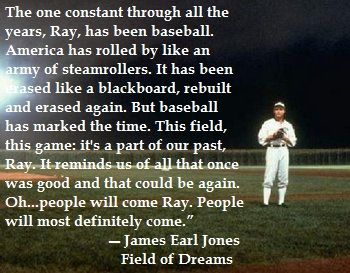“If you build it, he will come,” the voice of James Earl Jones echoes in our minds when we recall the plotline of the film, Field of Dreams.
A quick summary if you don’t know the movie: the “it” was a baseball field to be built in a rural cornfield. The “he” was a baseball player, ultimately joined by a dream-team of ball players who would convene on that dreamy field to play an amazing game.
Today, the day after Pfizer announced a 90% benefit for its coronavirus vaccine, bolstering Wall Street returns on 9th November 2020, two new consumer polls inspire the question about a field of dreams effect among U.S. health citizens contemplating taking a COVID-19 vaccine.
Let’s check out these polls, from Gallup and STAT-Harris, both out today.
 Gallup collaborated with Franklin-Templeton on an “acceptance experiment,” assessing 5,002 U.S. adults’ perspectives on the coronavirus, vaccine availability, regulatory approval timing, side effects, and levels of efficacy/effectiveness.
Gallup collaborated with Franklin-Templeton on an “acceptance experiment,” assessing 5,002 U.S. adults’ perspectives on the coronavirus, vaccine availability, regulatory approval timing, side effects, and levels of efficacy/effectiveness.
The first chart shows the differences in consumers’ receptiveness to get a COVID-19 vaccine based on 24 test conditions built on these factors.
Across the 24 conditions, consumers’ willingness to be vaccinated ranged from:
- A low of 36% based on a vaccine released this year (2020 at a minimum efficacy threshold, to,
- A high of nearly 52% assuming a release in 2021 with a high efficacy rate and no side effects.
The strongest impact on consumers’ acceptance of the COVID-19 vaccine was from telling people that the vaccine prevented disease in 100% of patients in the clinical trials versus 50% of patients. Furthermore, the vaccine acceptance rate increased if the vaccine were released in the first quarter of 2021 with “more assuring information” about the approval process, side effects and efficacy.
Making the vaccine “free” also had a big impact in raising vaccine acceptance. This was true even for the 21% of consumers who said they would not get the vaccine; but when considering getting the coronavirus vaccine at zero cost, that had a major impact on their decision to get it.
 Now, check out the STAT-Harris Poll published today on vaccine acceptance in the U.S., with the story’s title, “Most Americans won’t get a Covid-19 vaccine unless it cuts risk by half.”
Now, check out the STAT-Harris Poll published today on vaccine acceptance in the U.S., with the story’s title, “Most Americans won’t get a Covid-19 vaccine unless it cuts risk by half.”
That statistic is illustrated in the second bar chart shown here, comparing total U.S. adults with people who have had COVID-19, those having a close friend or family member who contracted the coronavirus, and those with an acquaintance who had COVID.
Note that more Americans who had COVID-19 would be more likely to get a vaccine with a lower level of efficacy (cutting risks by under 25%) than other people who had not experienced the coronavirus themselves.
The study also found that U.S. health citizens would be more likely to wear a mask and practice social distancing if they knew someone who had dealt with COVID-19 themselves.
STAT-Harris Poll studied 1,954 U.S. adults online at the end of October 2020.
Based on the data, the researchers inferred that, “even a less effective vaccine wouldn’t have an outsized impact on the public’s willingness to be immunized.” Two in three people said they would get a COVID-19 vaccine if their risk of contracting the virus was reduced by 75%.
Emphasizing that point, Rob Jekielek, managing director of The Harris Poll, said that, “If we’re actually at 90%, it’s going to reinforce for two-thirds of Americans who are then much more likely to take the vaccine, although I think it’s fair to say that it doesn’t need to be 90% effective to get that pull through. It may not necessarily need to be the 90% that Pfizer is showing in its preliminary results. But the data indicates it will have to be over 50% for the general public and over 75% for that younger generation of Americans.”
 Health Populi’s Hot Points: With vaccine hesitancy another aspect of the politically-charged coronavirus public health crisis in America, it’s useful to turn to some other data that came out of the Gallup-Franklin Templeton study, organized in the table.
Health Populi’s Hot Points: With vaccine hesitancy another aspect of the politically-charged coronavirus public health crisis in America, it’s useful to turn to some other data that came out of the Gallup-Franklin Templeton study, organized in the table.
These data focus on consumers who said they would not get the COVID-19 vaccine, revisiting the question with factors that might have an impact on the consumer changing their mind about opting into a vaccine when it would become available.
The most compelling factor driving those would initially opt out of a vaccine would be cost — that a free vaccine could persuade people to get the shot, for 21% of this group. “Free” played especially well among Democrats in this cohort. Democrats were more persuadable toward vaccine acceptance than Republicans or Independents.
The second most impactful factor that could persuade a consumer to get the vaccine would be their doctor’s recommendation to get the shot — again, more impactful among Democrats. The CDC’s recommendation would also be more persuasive to Democrats than to Republicans or Independents.
 The STAT-Harris Poll raised a key issue about trust varying by demographic group, beyond political party. The study found that the likelihood of Black Americans to get a COVID-19 vaccine was lower than among other racial/ethnic groups. This held true even at the highest levels of efficacy.
The STAT-Harris Poll raised a key issue about trust varying by demographic group, beyond political party. The study found that the likelihood of Black Americans to get a COVID-19 vaccine was lower than among other racial/ethnic groups. This held true even at the highest levels of efficacy.
Rebuilding trust is key for engaging patients in health care. Black Americans and other patient groups have experienced disproportionate mortality and morbidity due to the coronavirus, coupled with hard hits on family and household economies — loss of jobs, reduced hours, loss of health insurance. Finally, growing social discord in the U.S. highlighted by the death of George Floyd and other Black Americans bringing more light to systemic racism in the U.S.
Given the politicization of vaccines in the coronavirus pandemic in the U.S., coupled with health disparities and inequities in access and social determinants of health in America, just “building” the vaccine and ensuring the cold supply chain in distribution won’t be enough to bolster universal acceptance.
Return to the quote from Field of Dreams, spoken by the mellifluous James Earl Jones’ character, Terrence Mann:
“The one constant through all the years has been baseball. America has rolled by like an army of steamrollers….but baseball has marked the time…It reminds us of all that once was good and that could be again….People will come…People will most definitely come.”
In the spirit of mutualism, community, and public health — and following sound and trustworthy science — people will come. But it will take a village across the health/care ecosystem to build trust and that spirit of mutualism and community to get through to the other side of the coronavirus pandemic.
The post Will We See A Field of Dreams for the COVID-19 Vaccine in the U.S.? appeared first on HealthPopuli.com.
Will We See A Field of Dreams for the COVID-19 Vaccine in the U.S.? posted first on https://carilloncitydental.blogspot.com
No comments:
Post a Comment